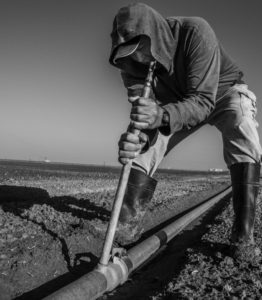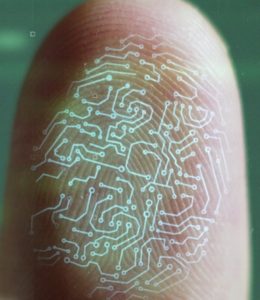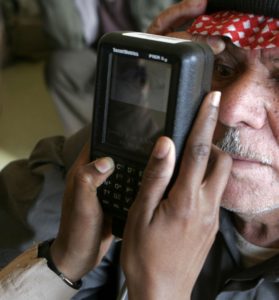Podcast: Play in new window | Download
Illegal People: How Globalization Creates Migration and Criminalizes Immigrants
California has a water crisis that is rooted in racism. About 1 million Californians in 130 communities still do not have access to clean, safe drinking water. Most of these people live in rural areas primarily populated by farmworker families.
This inequality can be traced to the Great Migration of African Americans from the South to the North at the beginning of the 20th Century. Met with discriminatory real estate practices, they were forced to build or rent homes in colonias with no water mains, sewer lines or lighting.
That racist legacy continues to plague people (primarily of Mexican descent) who live in San Joaquin Valley, one of the richest agricultural areas in the world. Growers who pump large amounts of water from the soil are at the top of the chain when it comes to water access. Next come residences and businesses. At the bottom of the water access chain are the residents of the colonias.
But the people are organizing and they have achieved a victory in their decade-long struggle for equal access to water.
Photojournalist David Bacon has documented this shameful inequality and the legislation the people have secured in his article, “The Color of Water,” which was published in April by The Nation and the Economic Hardship Reporting Project.
Guest – David Bacon is an author, political activist, and former union organizer who has focused on labor issues, particularly those related to immigrant labor. He is Senior Fellow at the Oakland Institute and the author of several books and numerous articles. His most recent book is “More Than a Wall/Mas que un muro” which documents the communities on either side of the Mexico/U.S. border in photographs and journalism.
—-
Disturbing Shift Away From Passwords And Into Biometric ID Systems
Are passwords becoming obsolete? Recently our own Heidi Boghosian published an op-ed in the Los Angeles Times on the disturbing shift away from passwords to fingerprints, eye scans, and other biometrics authentication systems. A consortium of businesses is working with security experts to develop more secure ways to access online accounts. Each year the United States loses TRILLIONS of dollars from avoidable data breaches. And that figure is growing. Compromised login credentials are responsible for at least one fifth of all these breaches.
Enter the FIDO Alliance, or “Fast Identity Online.” Alliance members Google, Apple and Microsoft are working on enabling a password-free world, suggesting users switch to a simple verification of their fingerprint or face—or biometrics.
What are the benefits and risks of such a transition? Heidi is here to fill us in on some biometrics basics, and to demystify how new password-less systems might work, and when we can expect to see them.
Guest – Attorney Heidi Boghosian is executive director of the A.J. Muste Memorial Institute, a charitable organization providing support to activist organizations. Before that she was executive director of the National Lawyers Guild. Her book is coming out in July 2021(Beacon Press). She received her JD from Temple Law School where she was editor-in-chief of the Temple Political & Civil Rights Law Review. She has an MS from Boston University’s College of Communication and a BA from Brown University. Heidi is the author of the 2013 book, Spying on Democracy, and the recent book I Have Nothing to Hide”: And 20 Other Myths About Surveillance and Privacy.
——————————————–




